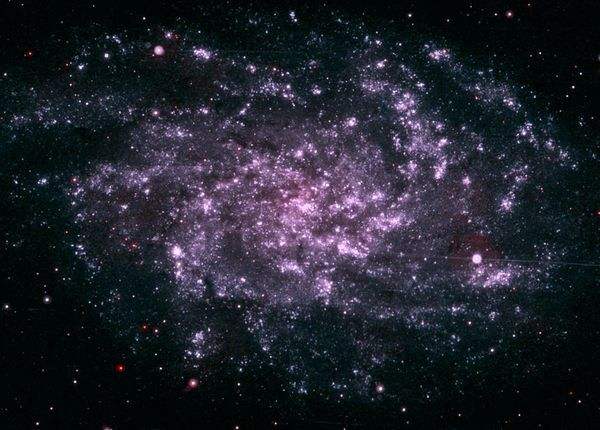(单词翻译:单击)
听力文本
This is Scientific American — 60-Second Science. I'm Christopher Intagliata.
The sun spews out ultraviolet radiation—that's why you put on sunscreen. But the sun isn't the only UV-producing celestial body. "Stars and supermassive black holes produce a huge amount of UV radiation." Michele Fumagalli, an astrophysicist at Durham University in the U.K. "And some of this radiation can escape a galaxy, and so this radiation builds up this cosmic UV background."
That cosmic UV background permeates the universe. But it's diffuse—meaning hard to measure, especially from here on Earth. "And so the way we do this measurement is with a little trick." That is, when UV radiation hits gas, it gives off a red glow. So Fumagalli and his team used what's called the MUSE instrument at the Very Large Telescope in Chile to stare—for hours—at the edge of a superthin galaxy, until they saw that red glow.
And since they knew how much gas was there, they were able to calculate the intensity of the UV radiation hitting the gas—the cosmic UV background. The finding is in the Monthly Notices of the Royal Astronomical Society.

That calculation offered clues to another celestial mystery, why we don't see as many small galaxies in the universe as theory would predict. Fumagalli says the UV background radiation might strip away valuable star-forming gas from the small guys.
"This is what happens to the small galaxies in the universe. They have gas, which is what's needed to form stars. But if that gas is radiated by intense UV radiation, essentially it evaporates. Which means the galaxies lose their supply of fuel to make new stars. Meaning they don't shine and we do not see them."
So the small galaxies remain dark. But bigger galaxies have a much smaller surface-to-volume ratio of star-forming gas—imagine a whole ocean of water compared to a tiny glassful. UV radiation can't strip away all the gas. So stars form. Like our sun. Which, when it comes to ultraviolet radiation here on Earth, is still the star of the show.
Thanks for listening for Scientific American — 60-Second Science Science. I'm Christopher Intagliata.
参考译文
这里是科学美国人——60秒科学。我是克里斯托弗·因塔利亚塔。
太阳会释放出紫外线,这就是我们需要涂抹防晒霜的原因。但是,太阳并不是唯一产生紫外线的天体。“恒星以及超大质量黑洞也会产生大量的紫外线辐射。”米歇尔·弗玛加利是英国杜伦大学的天体物理学家。“其中一些辐射可以逃离星系,所以这些辐射建立了这种宇宙紫外背景。”
这种紫外背景渗透在整个宇宙。但是这种背景呈弥散状,也就是说很难被测量,尤其难以从地球上进行测量。“所以,我们的测量方法采用了一个小技巧。”那就是,紫外辐射和气体接触以后,会散发出红光。因此弗玛加利和他的团队用智利甚大望远镜的MUSE设备观察了超薄星系边缘数个小时的时间,然后他们观测到了那种红光。
因为他们知道那里的气体含量,所以他们可以计算出紫外辐射和气体接触的强度,即宇宙紫外背景。这项研究结果发表在《英国皇家天文学会月刊》上。
这种计算方法为另一个天体秘密提供了线索:为什么我们在宇宙看到的小星系的数量没有预测的多。弗玛加利表示,紫外辐射背景可能会去除小星系中有价值的、可形成恒星的气体。
“这就是宇宙中的小星系所经历的情况。它们有能形成恒星的气体。但是如果气体受到了强紫外线的辐射,那基本上气体就会消散了。这表明星系会失去形成新恒星的燃料供应。也就是说,它们无法发光,所以我们看不到它们。”
所以,小星系仍然是黑暗的。而较大的星系在形成恒星的气体上拥有更小的表面体积比,想象一下一整个海洋的水和一小杯水的对比。紫外线辐射不能去除所有气体。所以,像太阳这样的恒星是可以形成的。而就地球上的紫外线辐射来说,太阳仍是关注重点。
谢谢大家收听科学美国人——60秒科学。我是克里斯托弗·因塔利亚塔。
译文为可可英语翻译,未经授权请勿转载!
重点讲解
重点讲解:
1. put on 穿;戴;涂;抹;
例句:Put on some cream to stop your nose from peeling.
抹点乳霜,以免你的鼻子再脱皮。
2. give off 释放,放出,发出(气体、热量、气味等);
例句:These gas lasers give off a continuous beam.
这种气体激光器产生连续不断的光束。
3. strip away 剥去;剥下;揭去;
例句:Sensitive Cream will not strip away the skin's protective layer.
敏感肌肤专用面霜不会破坏皮肤表面的保护层。
4. when it comes to 谈到;涉及;
例句:He's no slouch when it comes to writing books.
要说到写书他可是行家里手。


